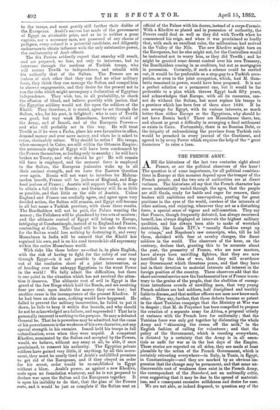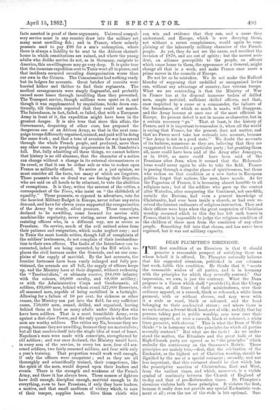THE FRENCH ARMY.
ARE the historians of the last two centuries right about France, or are the political observers of the hour ? The question is of some importance, for all political combina- tions in Europe at this moment depend upon the temper of the French people, and the two sets of authorities are at direct
variance. The historians all say that the French character has never substantially varied through the ages, that the people are still Gauls, ready for battle and eager for renown, their leaders still ambitious and unscrupulous, panting for great positions in the eyes of the world, careless of the interests of other nations, and enjoying, whenever they act as a disturbing force, a special sense of vigour and self-assertion. They say that France, though frequently defeated, has always recovered herself, has always displayed at intervals the highest military qualities, and has always been able to make of wretched materials, like Louis XIV.'s "rascally flunkies swept up by crimps," and Napoleon's raw conscripts, who, till he led them, shrieked with fear at cavalry charges, the finest soldiers in the world. The observers of the hour, on the contrary, declare that, granting this to be accurate about the past, the peasantry of France, who are now masters, have always been unwilling fighters, that they are now horrified by the idea of war, that they will overthrow any Government which threatens peace, and that they have lost in their devotion to material interests all interest in the foreign position of the country. These observers add that the short universal service now the fundamental law of France is con- trary to the genius of the people, that the abolition of exemp- tions introduces crowds of unwilling men, that very young French soldiers are bad soldiers, half disciplined and terribly liable to disease, and that neither officers nor men nowknow each other. They say, further, that these defects became so patent in the short Tunisian campaign that the Ministry at War was in despair ; that M. de Freycinet has been compelled to propose the creation of a separate army for Africa, a proposal utterly at variance with the French love for uniformity ; that the Tunisian force was only got together by dislocating the whole Army and "skimming the cream off the milk," in the English fashion of calling for volunteers ; and that the policy of the Government, which is receding everywhere, is dictated by a certainty that the Army is in all essen- tials as unfit for war as in the last days of the Empire.
These stories are repeated on all sides, they are made at least plausible by the action of the French Government, which is
certainly retreating everywhere—in Italy, in Tunis, in Egypt, in Constantinople—and they are marked by an obvious im- pression that the change may be permanent, and that some un- discoverable root of weakness does exist in the French Army, the correspondent of the Standard, not an unfriendly critic, even suggesting that it may be due to the spread of material- ism, and a consequent excessive selfishness and desire for ease.
We are not able, or indeed disposed, to question any of the
facts asserted in proof of these arguments. Universal compul- sory service must in any country draw into the military net many most unwilling fish ; and in France, where miserly peasants used to pay £80 for a son's redemption, where there is always a liability to be sent to the African charnel- house in which constitutions are ruined, and where the young adults who dislike service do not, as in Germany, emigrate to America, this unwillingness may go very deep. It is quite true that the immense expedition sent to Tunis went all to pieces, and that incidents occurred revealing disorganisation worse than our own in the Crimea. The Commissariat had nothing ready but its ledgers for accounts. Great batches of recruits were hurried hither and thither to find their regiments. The medical arrangements were simply disgraceful, and probably 'caused more losses through invaliding than they prevented. The Transport service, though millions were spent on it, and though it was supplemented by requisitions, broke down con- tinually, till Generals reported that they could not march. The Intendance, in fact, failed, so failed, that with a European Army in front of it, the expedition might have been in the greatest danger. It is also true that since this affair, the Government, despairing of other cure, has proposed the dangerous one of an African Army, so that in the next cam- paign troops differently organised, trained, and paid will be doing the same work ; and that a tone of aversion for war has spread through the whole French people, and produced, more than any other cause, its perplexing acquiescence in M. Gambetta.'s fall. But, fully admitting all these things, we cannot believe that history is an old almanac, that the character of a nation can change without a change in its external circumstances or its creed, or that it can be either safe or wise to reckon upon France as militarily effaced. To arrive at a just opinion, we must consider all the facts, too many of which are forgotten. These peasants who so dread war are forcing their Deputies, who are said on all hands to be reluctant, to vote the abolition of exemptions. It is they, writes the severest of the critics, a correspondent of the Times, who insist on "the shibboleth of equality." These peasants, so opposed to adventure, vote for the heaviest Military Budget in Europe, never refuse any extra demand, and have for eleven years supported the reorganisation of the Army by steady, silent pressure. These conscripts, declared to be unwilling, come forward for service with machine-like regularity, never rioting, never deserting, never resisting officers who, in a different way, are as severe as Prussians. On service, much of the evil noticed arises from their patience and resignation, which make neglect easy ; and in Tunis the most hostile critics, though full of complaints of the soldiers' lawlessness, do not complain of their insubordina- tion to their own officers. The faults of the Intendance can be corrected, indeed are being corrected, by the Bill which re- places the civil bureaus under the Generals, and no one com- plains of the supply of materiel. By the last accounts, the frontier fortresses have been vastly enlarged and fully pro- visioned, the arsenals are all full, the supply of officers keeps up, and the Ministry have at their disposal, without reckoning the " Territorialists," or ultimate reserve, 284,000 infantry with the colours, 68,000 cavalry, and 68,000 artillery ; or with the Administrative Corps and Gendarmerie, all soldiers, 499,000 men, behind whom stand 327,000 Reservists, all seasoned men, capable of being mobilised in a fortnight. Allowing for a failure of 10 per cent, for sickness or other causes, the Ministry can put into the field, for any sufficient cause, 750,000 men, armed, drilled, and organised, leaving behind them at least as many adults under thirty-five who have been soldiers. That is a most formidable Army, even against a first-class Power, and the only question is whether the men are worthy soldiers. The critics say No, because they are young, because they are unwilling, because they are materialists; but all that resolves itself into the single idea of want of heart. Napoleon's wars were made with conscripts, strengthened by old soldiers ; and war once declared, the Ministry would have, in every arm of the service, to every ten men, four old sea- soned soldiers, two fairly seasoned soldiers, and four with only a year's training. That proportion would work well enough, if only the officers were competent ; and as they are all thoroughly and scientifically trained, their competence, like the spirit of the men, would depend upon their leaders and events. There is the strength and weakness of the French Army, and there it has always been. These masses of fighters have drill enough, discipline enough, materiel enough to do everything, et en to face Prussians, if only they have leaders, a motive, and that small modicum of victory which, to men of their temper, supplies heart. Give them chiefs who can win and evidence that they can, and a cause they understand, and Europe, which is now decrying them, not without a secret complaisance, would again be com- plaining of the inherently military character of the French people. As yet, they do not see the cause, and recollect the invasion of 1870, and are out of spirits ; but the merest acci- dent, an alliance perceptible to the people, an affront which came home to them, the appearance of a General, might change all that in a week, and make France once more a prime mover in the councils of Europe. Do not let us be mistaken. We do not make the Radical blunder of supposing that undrilled or unorganised levies can, without any advantage of country, face veteran troops. What we are contending is that the Ministry of War in France has at its disposal immense bodies of drilled men, ample materiel, sufficient skilled officers, and that, once inspirited by a cause or a commander, the failures of the Intendance, of which so much is made, will disappear, and the Army become at once one of the most efficient in Europe. Its present defect is not in means or character, but in a certain necessary "go." That, at least, is the history of France, and it is important to remember it, when all the world is saying that France, for the present, does not matter, and that no Power need take her seriously into account, because "her Army is not in a good state." We doubt the accounts of its badness, numerous as they are, believing that they are exaggerated to discredit a particular party ; but granting them all, more could have been said of the Army after Jemappes, or in 1848, as more could have been said of the Prussians after Jena, when it seemed that the Hohenzol- terns would never again be able to take the field. France is passing through a singular phase of spiritlessness, but those who reckon on that condition as a new factor in European politics forget that nations, like men, have moods. As for the Paganism of France, it is becoming almost horrible to all
religious men ; but of the soldiers who gave up the contest after Waterloo, after conquering the Continent, not one-fifth, outside the Bretons, had even a general knowledge of Christianity, had ever been inside a church, or had ever re- ceived the faintest rudiments of religious instruction. They and their officers were boys when the great suspension of Christian worship occurred which to this day has left such traces in France, that it is impossible to judge the religious condition of the children of these men from the condition of any other people. Something fell into that chasm, and has never been regained, but it was not military capacity.



































 Previous page
Previous page